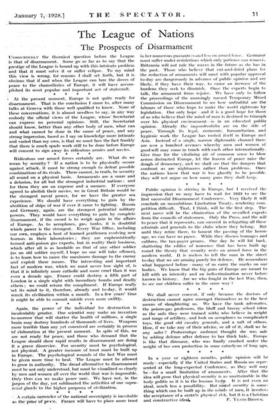- A certain iiiriehder of the national sovereignty is inevitable
as thepiice of pe-4m. France will have to place more trust in her numerous guaranteps and less on armed force. Germany must suffer under restrictions which only patience can remove. Britannia will not rule the waves in the future as she has in the past. Those who believe that cut-and-dried plans for the reduction of armaments will meet with popular approval to-day are dangerously in advance of public opi • and are likely, if they have their way, to cause an increase of the burdens they seek to diminish. Once the experts begin to talk, the armament firms rejoice. We have only to follow the proceedings of the amusingly named Temporary Mixed Commission on Disarmament to sec how unfruitful are the labours of those who hope to make the world righteous by legislation. Our only hope --and it is a good hope for those of us who believe that the mind of man is destined to triumph over his physical environment—is in an educated public opinion. Already the imponderabilia are on the side of peace. Through its legal, economic, humanitarian, and hygienic work the League has rooted itself in Europe and Asia. Instead of a single, narrow diplomatic channel there are now a hundred avenues whereby men and women of good-will may conic in touch with each other internationally. Give time for the vitalizing air of common sense to blow across distracted Europe, let the leaven of peace raise the dough of democracy, and we shall see that the dangers that confront us are nightmares rather than problems. Once the nations know that war is too ghastly to be possible. they will not argue on how many guns they shall keep.






































 Previous page
Previous page